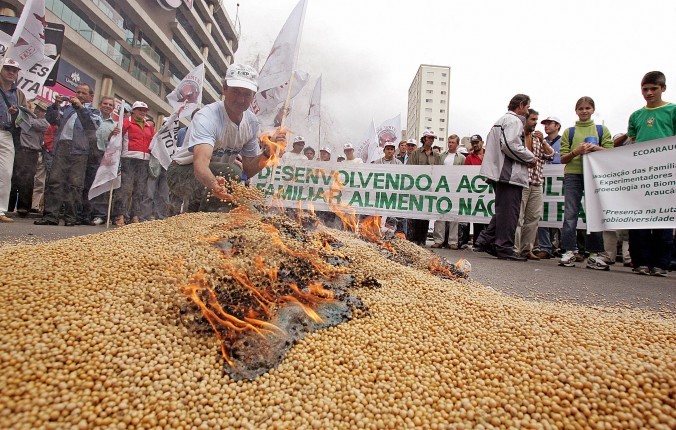GM crops in Brazil have brought higher agrochemical use and lower yields and productivity, according to a new report based on government data.

In the new report, the president of the Brazilian Association of Agrarian Reform (Abra), Gerson Teixeira, analyzes ten years of cultivation of GM seeds in Brazil.
Source: EcoDebate (GMWatch Translation from Portuguese)
In the report, the researcher makes some clear points regarding the consequences of this technology: high dependence, increased monoculture, increased use of pesticides and decreased productivity.
It all started, Teixeira noted, from the smuggling of Monsanto’s GM seeds, hitherto prohibited from use in Brazil.
Given this ‘fait accompli’, these products began to be released in the country under the pretext of “reducing costs, increasing productivity, reducing pesticide use, and many other advantages that turned out to predominantly materialise in our country in the form of huge profits for the big global agrochemical corporations.”
The actual result was the complete opposite. In “homage to the prophets of the alleged technical and environmental virtues of this scientific event”, the author deals more specifically with two of the “sirens’ songs” of GMOs: reduced pesticide use and increased productivity.
Just to give you an idea, pesticide use has increased in Brazil by around 190% in the past ten years, while in the rest of the world the increase was 90%.
Yet soybean yield in Brazil, for example, grew by only 4% in the last decade, compared to 31% growth between 1992/2003 [prior to GM crop legalisation].
Meanwhile, GM Watch reported today that by a narrow majority of just three votes, the proposal to allow releases of terminator seed was not included in the Brazilian congressional hearings this time.















Petition CBC News the National to Interview Dr Thierry Vrain
http://www.change.org/en-CA/petitions/petition-cbc-news-the-national-to-interview-dr-thierry-vrain-regarding-gmo-the-future-of-agriculture
Great news. So far, so good. Now watch up Carnival and World Cup for next trials… Usually they wait until those timing to approve big issues.
Lower yields? It looks like they have corn to burn !
Corn yields lower? I don’t think so.
http://www.pecad.fas.usda.gov/